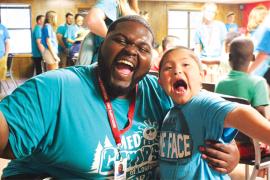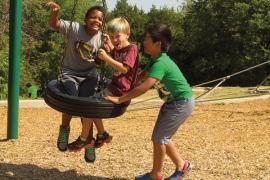“What do you do the rest of the year?”
Most year-round camp professionals have heard this question. And most have rolled their eyes at it. A look behind the scenes at the realities of what it takes to run a camp today confirms an often exhausting, full-time endeavor — not to mention the immense importance of camp and why we all do what we do.
As a former overnight camp director and current executive coach for camp directors, I know quite well that what is one camp’s issue is probably another hundred camps’ issue. Often, when I tell a director that they are far from the only one experiencing [fill in the blank], they are surprised. They shouldn’t be. This is an industry where we can learn so much from one another.
I love speaking to camp directors and visiting camps. As a social worker by training, I often encourage directors to vent and talk about their fears, frustrations, and anxieties with me, because only then can we dig into the work of making our camps, and ourselves, even better. No one can do this job alone.
Recently, I had the opportunity to interview more than 30 directors about various aspects of camp life. When asked how they balance everything they do to make their camps run as smoothly as possible, many were able to give succinct and practical answers. But some of those directors admitted that they are often overwhelmed, have poor work-life balance, are still in trial-and-error phases, or that they don’t quite know how they’re able to do it all.
Why does it seem more difficult to run a camp than it used to? What has truly changed in the past 10 or 20 years? The question should really be, “What hasn’t changed?”
Campers are dealing with more complex issues from behavioral challenges to physical and mental health. Staff, especially those who are unfamiliar with camp, are more overwhelmed in an increasingly anxiety-ridden world, and many are less willing to work very long hours for the entire summer, caring for campers who need a lot of attention — even though the gains in experience and community are unparalleled. Both campers and staff might be more reluctant to disengage from their phones, which many camps require (and rightfully so). Camps that serve food must contend with staff and camper allergies and dietary needs, which have increased over the years. Parents and guardians increasingly want up-to-the-minute “proof of life” in the form of photos and other updates. Costs keep rising. State and local regulations are often in flux. Competition for other summer programming seems to be at an all-time high, and school schedules are ever-changing.
Yes, it’s a lot.
When interviewing directors, I started with this question: “Looking to the future of the industry, what do you think are the most important issues or items to prioritize?”
Each of the following bullets indicates a central issue that directors mentioned in response to this question. Categories in bold were mentioned the most during these (approximately 30) interviews.
- Educating families and the public about how beneficial camps are
- Raising tuition rates — how far we can/should go
- Rising costs of running camp
- Mental health needs of campers and staff
- Programming
- Other events competing with the traditional camp season, such as vacations, specialty camps, and sports clinics
- Staff recruitment, retention, salaries, and demands
- Using new technologies to help run camp
- Security
- Climate change/environment
- Diversity, equity, inclusion, and belonging (DEIB)
- Director work-life balance
- Parental expectations, including being honest with camp families about what camp can and cannot do
- Flexibility of staff
- Managing crises
- Camper behavior and boundaries
- Ownership of private camps: individuals vs. group/corporate ownership
While these many topics can be overwhelming to think about all at once, if anyone can break them down and figure them out, it’s camp directors.
Rachel Chadwin, who directs Camp Mah-Kee-Nac (MA) along with her husband Jamie, said that directing camp is “nowhere near as simple as it used to be. We have adapted, but with intention and purpose . . . [it is] important to stay true to values, culture, and traditions while modernizing as the years go on.”
Jared Gelb, director of Camp Ramaquois (NY) and Andy Pritikin, director of Liberty Lake Day Camp (NJ), spoke of the incredible professional and personal time investment it takes to keep their camps going strong. Steve Purdum, director of Camp Mishawaka (MN), agreed, recounting a moment a few years ago when Bob Ditter, a licensed clinical social worker specializing in child, adolescent, and family therapy and all-around camp pro, stirred up emotion in a roomful of directors when he mentioned the tremendous personal cost that directing camp can sometimes have.
And Liz Stevens, director of Camp Walden (MI), summed up the feelings of many when she said, “I am not going to pretend that the longer I’m in this job, the easier it gets.”
Yet, through all the difficult moments in talking to directors, a nearly universal sentiment emerged: camp is more important than it has ever been.
The following are some of the specific, compelling comments they had to share with us.
The More Helping Hands, the Better
How can directors ease the burden of running camp?
To keep up with the increasing demands on directorship, many camps have increased the size of their leadership teams, both year-round and seasonally. Dana Kite, director of Lake of the Woods and Greenwoods Camps (MI), found great value in “surrounding myself with really competent people who share the vision and passion.”
Mitch Reiter, director of Camp Towanda (PA), and Drew Bitterman, director of Camp Watitoh (MA), echoed this sentiment by advising directors to hire strong leadership teams.
Dave Devey, who began as a camper at Falcon Camp (OH) and has now been the camp’s director for 40 years, said: “Over the years it’s changed from me doing everything — recruiting to maintenance to books — to assembling a comfortable team. I’ve got a tremendous team, with increased responsibilities on everyone. I just let them do their things. I couldn’t possibly do all the things I did years ago by myself, because everything is more complicated.”
In a similar vein, Andy Pritikin remarked that it’s harder to be hands-on day-to-day because there are so many more pieces of camp directing now, one example for him being an increase in regulations. Both Pritikin and Cassie and Justin Mayer, directors of Camp Timber Lake West (NY), have increased the numbers of their summer leadership who oversee camper groups so there are more layers of support for the staff.
Meaghan Baumgartner, executive director of Camp Nor’wester (WA), agrees that layers of staff support are necessary to make a camp run smoothly because directors can’t go it alone. “You have to show up and take care of yourself,” she said.
Pritikin thinks that many camp directors try to do it all and aren’t particularly good at delegating. But we all know that delegating is necessary. Part of a functional camp leadership team means capitalizing on people’s strengths. At Maine Teen Camp, Director Matt Pines told me, “Different people have different areas they’re in charge of . . . [it’s about] finding the right people who can take a particular chunk and trust that it’s getting done.”
Director Steven Bernstein of Camp North Star (ME) and Executive Director Terrie Campbell of Camp Howe (MA) recommended outsourcing both smaller and bigger jobs to people who can help in broader or more specific areas, such as consultants, fractional CFOs, those available through short-term project apps like Fiverr and UpWork, and even artificial intelligence in some cases.
Beth Johns-Thomas, director of Nobles Day Camp (MA), said that her full-time, year-round team of three is essential, and additionally, that her seasonal leadership team meets about monthly, which is extremely helpful.
Paul Isserles, director of Eisner Camp (MA), shared a key component of what makes it all work for him: “I always try to make sure I have fun every day with campers and staff. I push the director team to get out and about and see the fun of camp. I love getting to know campers and staff and finding small opportunities to play and get into real camp life. Having the campers have that relationship with me [is important] in the fun times as well as the challenging times.” And he reminds directors, “Make sure to take a rest, take a break — if you can’t take care of yourself, you can’t be there to take care of everyone else.”
Camper Parents and Guardians — Management and Micromanagement
I spoke with one camp that had recently fielded a call from a parent who, after viewing her child’s baggage Air Tag locations, asked why one of the child’s bags was in the cabin area and one seemed to be in the dining hall. The parent interrupted the camp’s directors to get this information. Of course, I have also heard about those who put Air Tags directly on their children and then question, for example, why a day camp bus was taking a different route (answer: there was construction). How do camps help not only to establish trust between the camp and the parents, but also to allay their anxiety?
This is where camps do some of their best work. So many parents wish they could stop hovering. They aren’t necessarily proud of their overprotection. They want permission to let go a little. But they don’t know how else to exist in a world that is full of anxieties. Directors can remind parents that camp is that gift that allows them to “let go” for the day, the week, or the entire summer. Tell them when you’ll be checking in and when you won’t. What can they expect from you, and what can’t they expect? Every camp is going to be different.
We have all had the camper parents who we laugh with and who are a pleasure to speak to — and we’ve all had the camper parents who make us want to run and hide when we find out they’re on the phone. How do you get as many of them as possible to behave in a rational manner? Like anything else, you must start by setting expectations.
Many directors, including Wendy Siegel, director at Tyler Hill Camp (PA), see that before choosing a camp, parents are spending more time asking detailed questions and trying to find the right camp for their child. That interest and level of detail may only increase once they register for camp. Similarly, Jason Samuel, director of The Nature Place Day Camp (NY), has seen a shift in parental expectations as millennials start to send their children to camp.
Talking to — or at least connecting with — parents directly can be very helpful. Mark Lipof, director of Camp Micah (ME), noted that a lot of parent communication issues have been mitigated by being direct about communication between camp and parents. In his own camp’s case, he adds that, “Putting out a communication guide really helped.”
Director Dana Kite of Lake of the Woods and Greenwoods Camps (MI) agrees. “Meeting and exceeding parents’ expectations is a target that feels like it’s constantly moving,” she said. “It’s all about managing expectations. Everyone knows what to pack from the packing list, so similarly, it’s really important to spell out [communication policies] for parents.”
Sheryl Kirschenbaum, director of Surprise Lake Camp (NY), underlined the need to discuss these expectations. “Once a month we do new family orientation, we’re doing more meetings, we’re talking about what to expect.” Certainly, a combination of setting these expectations and then going over them in real time is going to have more impact than just one of those modes alone.
Frank Silberlicht, executive director of Camp Young Judaea-Texas, said: “Some parents want photos every day, they’re anxious, and want communication in as real-time as possible. We set the expectations, and that was better.” He added, “You almost need a training for first-year parents of campers.”
Remembering the Why
In the recent bestseller The Anxious Generation, which has shed light on a connection between childhood anxiety and smartphone use (particularly social media), author and psychologist Jonathan Haidt specifically mentions summer camp as an important part of childhood because of the benefits it provides, many of which are unavailable in the technology-heavy, phones-in-our-face world we live in (2024) .
As a parent of two young children, I often hear from fellow parents who struggle to give their kids enough independence, but not so much that it turns very risky. There is a struggle to teach the value of face-to-face friendships, to help their children use their imaginations to make their own fun instead of resorting to electronics when bored, to spend time outside and get dirty, to learn how to take care of themselves, and to learn how to live with others even when they might not get along all the time.
Camp hits on all of these — so I often find myself saying, “Send them to camp!”
Mitch Reiter of Camp Towanda put it this way: “For traditional camping, value is increasing as the world becomes crazier and more fast-paced. This is the last place where kids are allowed to be kids. They’re not worrying about seeking parental approval, and they’re off of electronics.”
Jared Gelb of Camp Ramaquois notes that he’s seen an increase in families in which the parents did not necessarily grow up at camp, so he seeks to educate them on why the investment in camp is so important.
Cliff Lissner, director of Chippewa Ranch Camp (WI), talked to me about “disconnecting to connect” in what is increasingly “a texting/emoji world,” stating that camps have a very important part to play in teaching the value of face-to-face friendship as well as conflict resolution.
“[We need to] push the idea, not just to parents but to the educational world, on the value of what we do,” said Dave Devey of Falcon Camp (OH). “We provide constant growth opportunities. We do it better than anyone . . . we need to educate everyone as to this value . . . and to let people know that there are camps for everybody.”
Directors: your job may be more demanding than ever, but it’s also more important than ever. Keep providing the best places for kids to be themselves — and let’s keep figuring out how to do it, day by day, together.
Photo courtesy of Camp Tawonga, Groveland, CA.
Reference
Haidt, J. (2024). The anxious generation: How the great rewiring of childhood is causing an epidemic of mental illness. New York, NY: Penguin Press.
Nick Teich, PhD, LCSW, owns Fairwinds Camp Consulting (consultforcamp.com), where he is an executive coach and consultant for camp directors. Nick can be reached at [email protected] or 207-200-5228.



